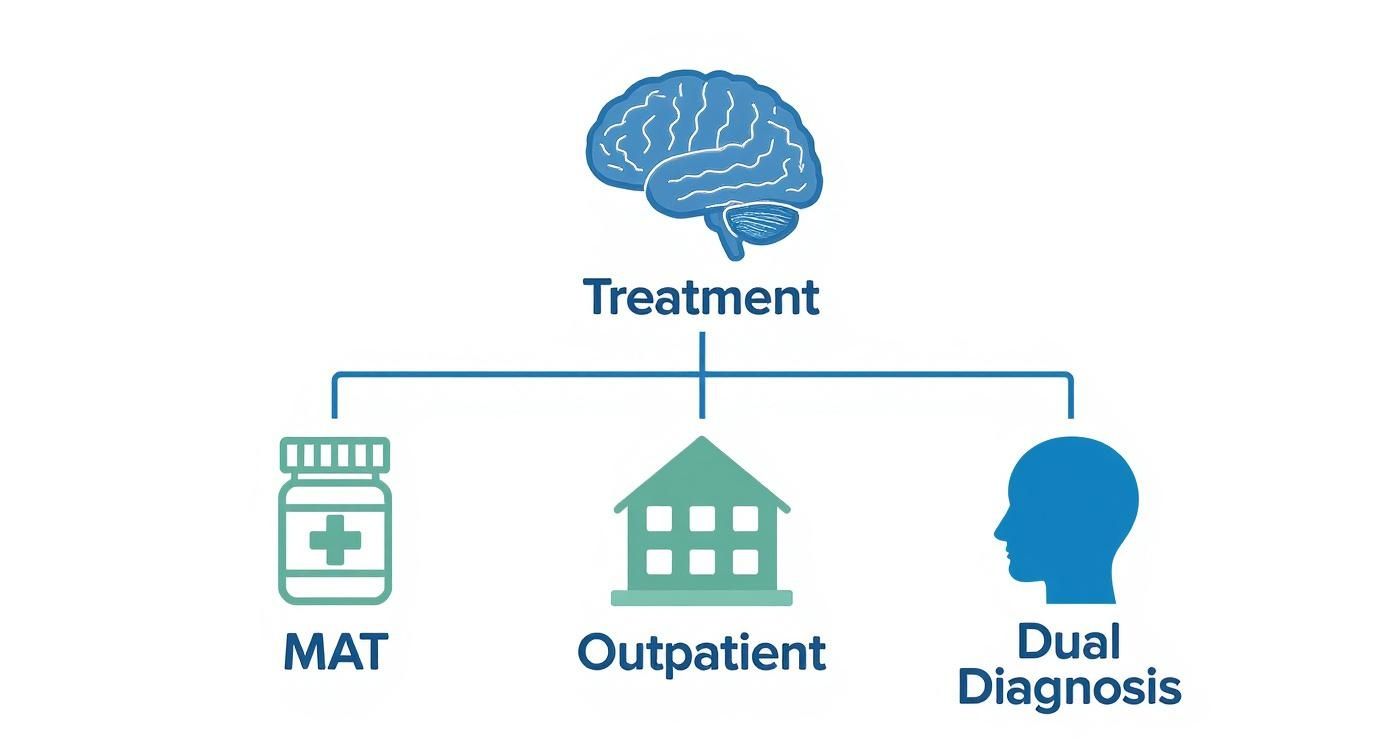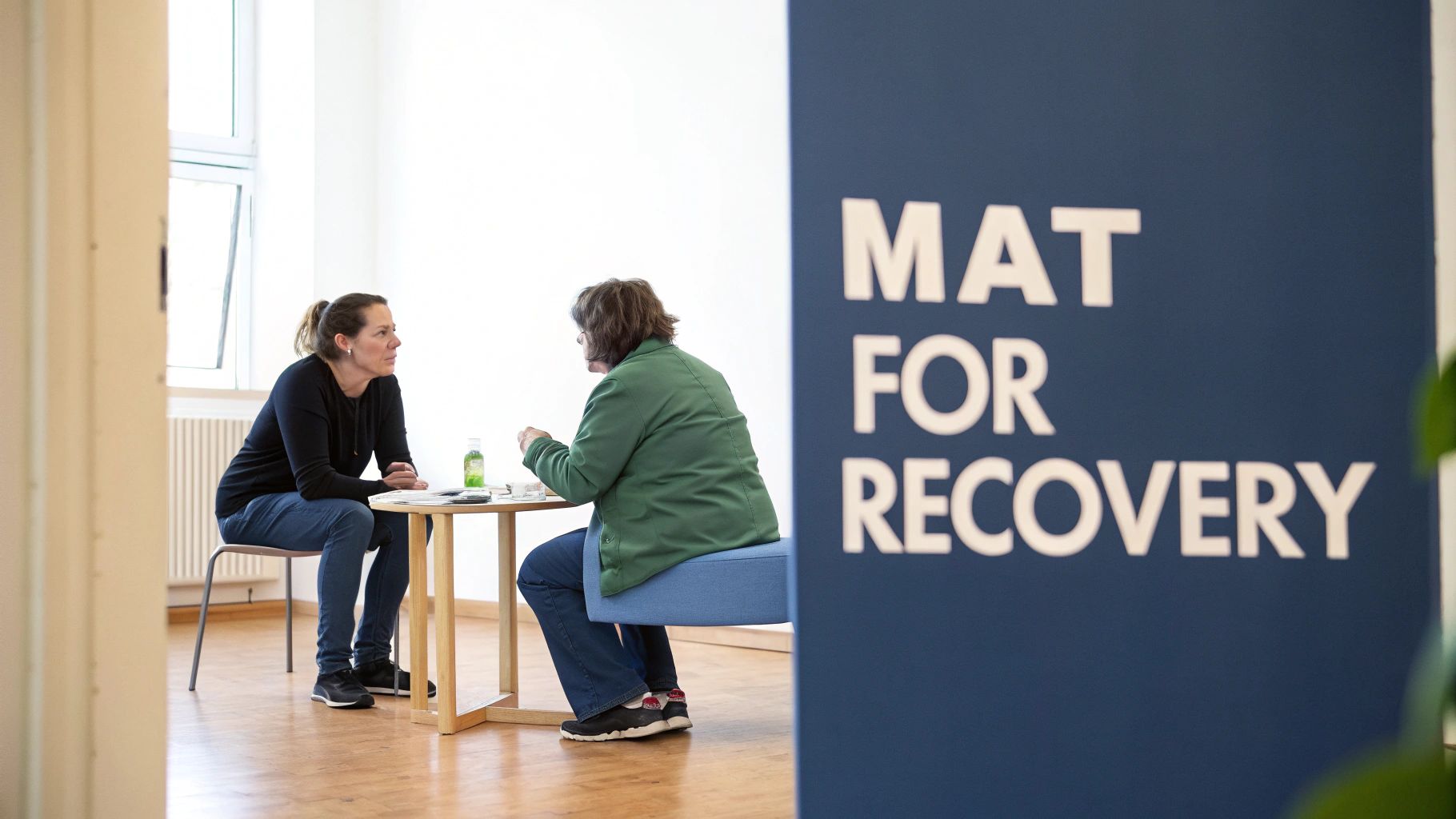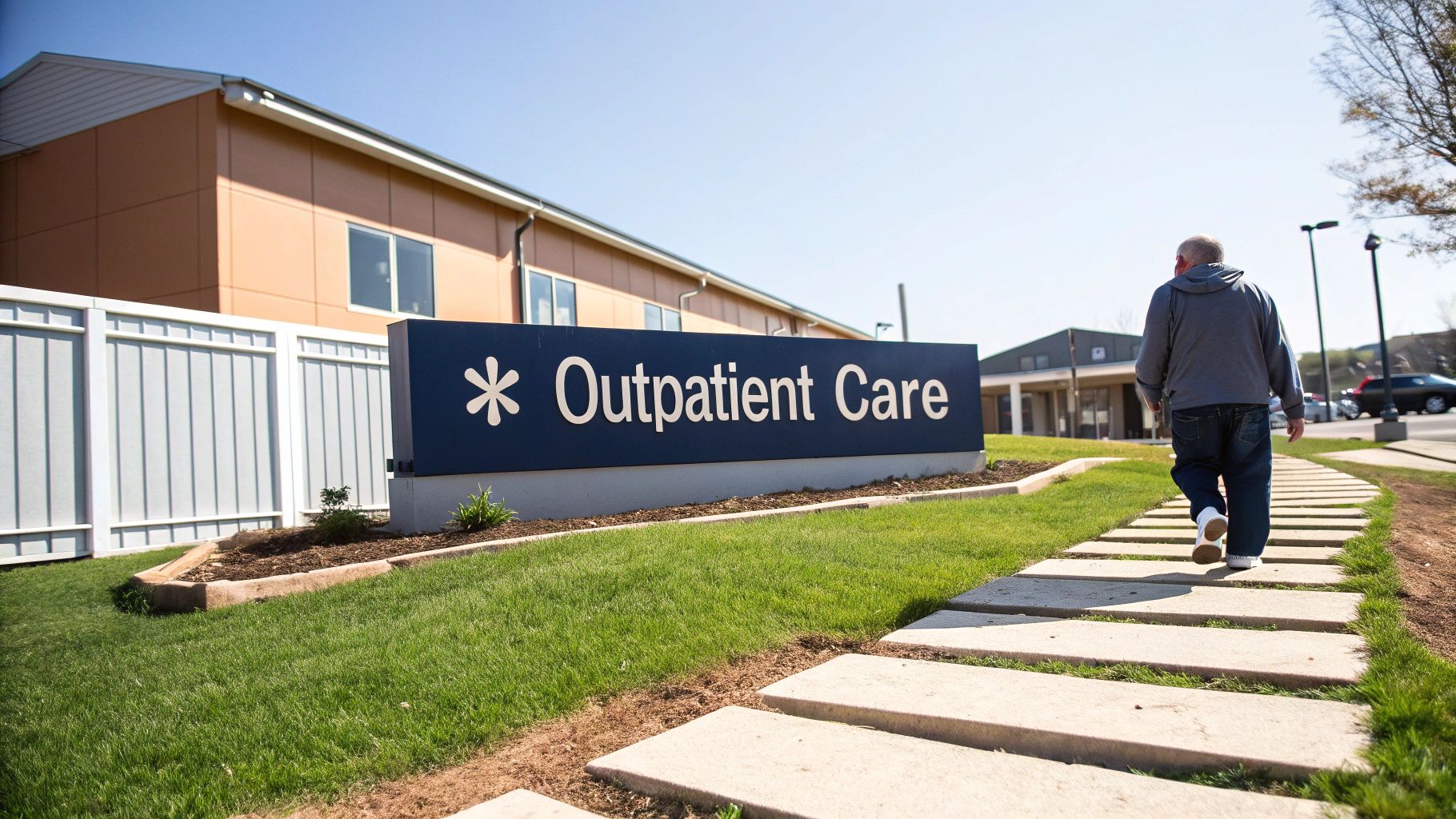When you or someone you love is struggling with opioid addiction, finding the right help can feel overwhelming. But there's a clear path forward, and it starts with understanding the real, evidence-based opioid addiction treatment options available right here in Massachusetts. This guide cuts through the noise to give you a practical roadmap to lasting recovery.
Key Takeaways
- Medication is a Medical Tool: Medication-Assisted Treatment (MAT) uses FDA-approved medications like Buprenorphine to stabilize brain chemistry, reduce cravings, and prevent overdose. It's a medical necessity, not a moral failing.
- Flexible Treatment is Available: Outpatient programs in Massachusetts, including Day Treatment (PHP) and Intensive Outpatient (IOP), offer structured, effective care that allows you to live at home and maintain work or family commitments.
- Mental Health Matters: Dual diagnosis care, which treats addiction and co-occurring mental health conditions like anxiety or depression simultaneously, is the gold standard for effective, long-term recovery.
- Local Support is Crucial: Having access to quality treatment centers in your community, such as those on the Massachusetts South Shore, removes significant barriers and makes it easier to build a sustainable support system close to home.
Your Path to Recovery Begins Here
Before we get into the specifics of different programs, let's start with a few foundational ideas. Think of these as the core principles that guide effective treatment and give you a framework for the journey ahead.
Guiding Principles of Modern Treatment
- Treatment is a Medical Necessity, Not a Moral Failing: It's critical to understand that Opioid Use Disorder (OUD) is a recognized medical condition, not a weakness of character. The most effective approaches combine medical interventions, like Medication-Assisted Treatment (MAT), with psychological support to heal both the brain's chemistry and the behavioral patterns behind addiction.
- Multiple Levels of Care Exist: There's no such thing as a one-size-fits-all recovery plan. Treatment options are designed to meet you where you are, ranging from intensive residential programs to flexible outpatient services. This allows you to find a structure that fits your life, your needs, and your recovery goals.
- Integrated Care is Crucial: It's incredibly common for people with OUD to also struggle with mental health conditions like anxiety, depression, or trauma. The best treatment plans don't treat these as separate issues; they address both at the same time through what's known as dual diagnosis care.
- Long-Term Support is Key to Success: Finishing a program isn't the end of the road—it's the beginning of a new way of living. Lasting recovery is built on a strong foundation of ongoing support, which includes aftercare planning, family involvement, and connecting with peer support groups.
This infographic provides a great visual overview of how these essential pillars work together in a modern, comprehensive treatment plan for opioid use disorder.

It really shows how Medication-Assisted Treatment, outpatient programs, and dual diagnosis care are not separate tracks but interconnected parts of a single, supportive journey.
The need for these effective, integrated treatments is more urgent than ever. While the CDC reported an encouraging nearly 24% decline in U.S. drug overdose deaths between late 2023 and late 2024, overdose tragically remains a leading cause of death for Americans aged 18 to 44. This drop proves that treatment works, but it also reminds us that the fight is far from over. You can dig deeper into these national trends directly from the CDC.
Understanding Medication-Assisted Treatment (MAT)
When you start looking into treatment for opioid addiction, you’ll quickly come across the term Medication-Assisted Treatment, or MAT. It’s one of the most effective, evidence-based approaches out there, but it’s also widely misunderstood. A common myth is that MAT is just about trading one drug for another. That couldn’t be more wrong.
Let’s reframe it. Think about how someone with diabetes uses insulin to manage their condition. Opioid addiction physically rewires the brain, creating powerful cravings and agonizing withdrawal symptoms that make it almost impossible to focus on anything else. The medications used in MAT work similarly to insulin—they help stabilize the brain’s chemistry, correcting the imbalance caused by addiction. This gives you the solid ground you need to stand on to begin the real work of psychological healing.
How MAT Medications Actually Work
The main job of MAT is to dial down the intense cravings and withdrawal symptoms so you can fully show up for therapy and start rebuilding your life. FDA-approved medications like Buprenorphine (often known by the brand name Suboxone) and Naltrexone (Vivitrol) get this done in a couple of different ways.
- Buprenorphine: This is what’s called a partial opioid agonist. It docks into the brain's opioid receptors just enough to stop cravings and keep withdrawal at bay, but it doesn't create the "high" that drives addiction. In a way, it takes up space on those receptors, so other opioids can't attach.
- Naltrexone: This one is an opioid antagonist, which means it completely blocks the opioid receptors. If someone on Naltrexone were to use opioids, they wouldn't feel any of the effects. This effectively breaks the cycle of use and reward, removing a major incentive for relapse.
These aren't just symptom-reducers; they are life-saving tools. Study after study has shown that being in a MAT program dramatically reduces the risk of a fatal overdose.
The Power of Combining Medication and Therapy
While the medication is a game-changer, it works best as part of a complete treatment plan that also includes counseling and behavioral therapy. This "whole-person" approach is the gold standard for a reason. Medication stabilizes you physically, while therapy helps you dig into the root causes of addiction—the thoughts, feelings, and behaviors that got you there.

Here in Massachusetts, integrating MAT into our outpatient programs means people can get this essential medical care without having to put their entire life on hold. By pairing medication management with individual and group therapy, we address the biology and the psychology of addiction at the same time. To see how this plays out in practice, you can learn more about our specific approach to Medication-Assisted Treatment on the South Shore.
Exploring Outpatient Programs in Massachusetts
For a lot of folks in Massachusetts battling opioid addiction, the thought of hitting pause on life—stepping away from jobs, school, and family—just isn't an option. That’s where outpatient programs come in, offering a powerful and realistic path forward. They’re built to deliver top-notch, structured care that weaves into your life, not the other way around.
Think of outpatient treatment like a series of stepping stones. Instead of one giant leap into a residential facility, you take smaller, more manageable steps, building your confidence and skills along the way. This approach lets you immediately apply what you learn in therapy to the real-world challenges you face every single day, strengthening your recovery right where you live and work.
Different Levels of Outpatient Care
Not all outpatient programs are created equal. Here in Massachusetts, treatment centers like ours offer different levels of intensity, or "care," to make sure you get the right amount of support at the right time.
- Day Treatment Program (PHP): This is the most intensive outpatient option. You’ll spend several hours a day in treatment, five days a week, giving you a highly structured routine similar to residential care but with the freedom to go home at night. It’s a great fit for people who need a lot of support but have a stable and safe home life.
- Intensive Outpatient Program (IOP): A step down from PHP, an IOP usually involves meeting for a few hours a day, a few days a week. It strikes a great balance, providing robust individual and group therapy while leaving more time for your job or family obligations.
- Outpatient Program (OP): This is the most flexible level of care, often consisting of just one or two therapy sessions a week. OP is perfect for those who've finished a higher-level program and need ongoing support, or for individuals whose struggles with addiction are less severe.
To make these distinctions clearer, here’s a simple breakdown of how the commitment and goals differ across these programs.
Comparing Outpatient Program Levels of Care
| Program Level | Weekly Time Commitment | Primary Goal | Ideal Candidate |
|---|---|---|---|
| Day Treatment (PHP) | 25-30 hours (5 days/week) | Stabilize and build foundational recovery skills in a highly structured setting. | Someone stepping down from residential care or needing intensive daily support. |
| Intensive Outpatient (IOP) | 9-15 hours (3-5 days/week) | Integrate recovery skills into daily life while managing work/family. | An individual who is medically stable but needs significant therapeutic structure. |
| Outpatient (OP) | 1-3 hours (1-2 days/week) | Maintain long-term recovery and manage ongoing life stressors. | A person who has completed a higher level of care or has strong recovery skills. |
Each level serves a distinct purpose, ensuring that your treatment plan evolves with you as you grow stronger in your recovery.
What a Week in Treatment Looks Like
Your actual weekly schedule will vary based on your program, but most outpatient opioid addiction treatment options are built around a core blend of therapeutic activities. These sessions all work together to tackle the psychological side of addiction while equipping you with the practical, hands-on skills needed for a sober life.
This photo shows a group therapy session in action—a cornerstone of outpatient treatment where people connect, share their stories, and build a powerful support system with others who truly get it.

That feeling of collaboration and support you see here is vital. It helps people feel understood and breaks down the isolation that so often comes with addiction.
The real power of outpatient treatment lies in its integration with daily life. Learning to navigate a stressful day at work and then immediately process that experience in a group therapy session is how lasting change is built, one day at a time.
For anyone on the South Shore, this kind of integrated care is right here in your backyard. We’ve structured our programs to provide exceptional clinical support that fits the realities of everyday life. You can learn more about finding an effective outpatient addiction treatment program on the South Shore that works for you. Having that local access makes all the difference in achieving long-term recovery.
The Critical Role of Dual Diagnosis Care
Treating opioid addiction is rarely as simple as just focusing on the substance. More often than not, there’s a co-occurring mental health condition fueling the fire just beneath the surface. We call this a dual diagnosis, and it's a concept that is absolutely essential to grasp if you or a loved one is seeking a real, lasting recovery.
Think of it this way: trying to fix a boat with a broken engine while ignoring a huge hole in the hull is a losing battle. You can get the engine running perfectly, but the boat is still going to sink. That's exactly what happens when you treat an opioid addiction without also addressing conditions like anxiety, depression, or PTSD. One problem feeds the other in a cycle that's nearly impossible to break if you don't tackle them together.
Why Integrated Treatment is the Only Way Forward
For so many people, the mental health struggle came first. The opioids were just a way to self-medicate—a desperate attempt to quiet overwhelming anxiety or numb the constant ache of depression. On the flip side, the chaos, chemical changes, and life disruptions caused by an active addiction can easily trigger or worsen those very same mental health conditions.
This creates a dangerous feedback loop. Someone feels a wave of intense anxiety, uses opioids to cope, and then experiences even worse anxiety when the drug wears off, driving them to use again. This is precisely why a fragmented approach—seeing a therapist for anxiety and a separate doctor for addiction—so often falls short. Real, sustainable recovery demands an integrated plan that heals the whole person, not just one part of the problem.
This photo shows a one-on-one therapy session, which is where the real work of untangling these connected issues happens. It's a safe space to explore the roots of the behavior with a trained professional.

In a true dual diagnosis setting, this isn't just a conversation about addiction. It's about getting to the core of the emotional triggers and thought patterns that drive the entire cycle.
Specialized Therapies for Co-Occurring Disorders
Effective dual diagnosis care isn't just about having two different specialists in the same building; it’s about coordinating psychiatric support with addiction counseling. We use specific therapies designed to hit both issues at once.
- Cognitive Behavioral Therapy (CBT): This is a cornerstone of dual diagnosis care for a reason. CBT helps people learn to identify, challenge, and ultimately reframe the negative thoughts and behaviors that connect their mental health symptoms to their substance use. It gives them practical tools, like learning new coping strategies for panic attacks that don’t involve reaching for opioids.
- Coordinated Psychiatric Care: This means having a psychiatrist who understands addiction managing medications for mental health. They can prescribe effective, non-addictive medications for anxiety or depression that work in harmony with opioid addiction treatment options like MAT, ensuring the entire treatment plan is safe and cohesive.
Addressing both the substance use disorder and the co-occurring mental health disorder at the same time is not just a best practice—it is the standard of care for achieving long-term recovery. Neglecting one side of the equation almost guarantees the other will eventually falter.
Providers across Massachusetts recognize this critical link. For those on the South Shore, finding a program that specializes in this integrated approach is key. You can learn more about how a dual diagnosis treatment program in Massachusetts is structured to provide this comprehensive support.
Building Your Long-Term Support System
Finishing a treatment program is a huge accomplishment, but it’s not the end of the road. Think of lasting recovery less like a graduation and more like learning to manage a chronic health condition. It takes ongoing care and, just as importantly, a strong support network.
The two things that make the biggest difference for long-term success are getting your family involved and having a solid aftercare plan. Addiction doesn't happen in a vacuum—it impacts the entire family, and their participation is key to everyone healing. An aftercare plan, meanwhile, becomes your personal game plan for navigating life's challenges without falling back on old habits.
The Role of Family in Healing
Opioid addiction can really strain the most important relationships in a person's life, often leading to a cycle of mistrust and poor communication. This is where family therapy can be incredibly powerful. It creates a safe, professionally guided space where everyone can learn how to talk to each other again, set healthy boundaries, and understand the roles they might have unintentionally played in the addiction cycle.
When family members participate in therapy and educational programs, they shift from feeling frustrated and helpless to becoming informed, supportive allies. This kind of collaborative healing is a central part of many opioid addiction treatment options in Massachusetts because we know a supportive home environment is one of the best defenses against relapse.
This photo captures the essence of a support group, showing just how powerful it is when people with shared experiences come together to heal.

This feeling of connection is so important. It breaks down the isolation that addiction thrives on and builds a network of people who truly get what you’re going through.
Crafting a Strong Aftercare Plan
Your aftercare plan is basically your roadmap for staying sober once formal treatment ends. It’s a proactive strategy, and it needs to be tailored to your specific triggers, strengths, and goals. A good plan isn't just one thing; it's several key pieces working together.
- Ongoing Therapy: Sticking with individual or group therapy gives you a consistent space to work through challenges, celebrate wins, and sharpen your coping skills.
- Support Groups: Groups like Narcotics Anonymous (NA) or SMART Recovery provide invaluable peer support and a sense of community that helps with long-term accountability.
- Relapse Prevention Strategies: This means knowing your personal triggers—whether they're people, places, or emotions—and having a concrete plan for what to do when they pop up.
- Healthy Routines: Building a structured life around positive habits like exercise, good nutrition, and mindfulness is fundamental to restoring both your physical and mental health.
A crucial mindset shift is to see aftercare not as a chore, but as a commitment to your own well-being. It’s about being proactive in managing your health so you can stay strong, resilient, and ready for whatever life throws your way.
Taking the First Step to Recovery in Massachusetts
It’s one thing to know you need help. It’s another thing entirely to figure out where to start. If you're looking for opioid addiction treatment options in Massachusetts, the path forward can feel overwhelming, but it’s simpler than you might imagine. The whole journey begins with one confidential phone call.
That first conversation is just a pressure-free, no-judgment chat to get a feel for what’s going on. From there, we typically move on to verifying your insurance. At South Shore Recovery Center, we work with most major insurance plans in Massachusetts because we believe care should be accessible and affordable. Getting the financial piece sorted out early lets you focus on what really matters: your health.
What Happens After the First Call?
Once your insurance is good to go, the next step is a clinical assessment. Think of this less like a test and more like a real conversation. You’ll sit down with a compassionate professional whose only goal is to understand your story—your challenges, your history, and what you want for your future.
Based on that conversation, we’ll work with you to map out a personalized treatment plan. This plan will detail the specific therapies and the right level of care, like our Day Treatment or Intensive Outpatient programs, that will set you up for success.
Your First Steps, Simplified
- It all starts with a call. One simple, confidential phone call gets the ball rolling.
- We handle the insurance part. Our team verifies your benefits to take that stress off your plate.
- The assessment is a team effort. You and a clinician will work together to figure out your specific needs.
- Your treatment plan is yours alone. We don't do cookie-cutter solutions; your path to recovery is built just for you.
The journey to recovery is built on a series of small, courageous actions. Making that initial call is the most powerful one you can take, opening the door to a supportive and structured path forward right here on the South Shore.
Thanks to recent legislative changes, getting into treatment is easier than it's ever been. The Mainstreaming Addiction Treatment (MAT) Act, which passed in 2022, got rid of old barriers that made it difficult for healthcare providers to prescribe buprenorphine for opioid use disorder. This change is a huge step forward, treating addiction like the chronic medical condition it is and making care part of mainstream healthcare—something desperately needed for the estimated 2.1 million Americans with OUD. You can learn more about these important policy updates and their impact.

Frequently Asked Questions
Is Medication-Assisted Treatment Just Replacing One Addiction with Another?
This is probably the biggest misconception we hear about opioid addiction treatment options, and it’s one worth clearing up. The reality is that MAT is the complete opposite of swapping addictions. It uses medications like buprenorphine in a controlled, clinical way to stop the relentless cravings and painful withdrawal—not to produce a "high." Think of it like a diabetic taking insulin. The medication corrects a real, biological imbalance. By stabilizing your body and mind, it gives you the mental space to fully engage in therapy and start untangling the roots of the addiction.
How Long Does Opioid Addiction Treatment Last?
There's no magic number here. How long you're in treatment is a personal thing, based on factors like the severity of the addiction, whether there are other mental health conditions to address, and how you're progressing. A common path might be starting with a more intensive program for 30 to 90 days and then stepping down to less frequent outpatient support for several more months. The goal isn't to race to a finish line; it's to build a stable, sustainable recovery that genuinely improves your quality of life.
Can I Keep My Job While in an Outpatient Program in Massachusetts?
Yes, absolutely. This is one of the main reasons outpatient programs, like an Intensive Outpatient Program (IOP), are so effective. They are built to provide powerful, structured care without forcing you to put your entire life on hold. Many programs across Massachusetts, including those on the South Shore, offer flexible schedules with morning and evening sessions. This design lets you manage your professional and family duties while dedicating time to your recovery.
What Happens If I Have a Relapse?
First, it’s important to know that a relapse isn't a sign of failure. It's often a sign that the current treatment plan needs an adjustment. A good treatment program will work with you from day one to build a strong relapse prevention plan. If a slip-up does happen, the most crucial thing is to be honest with your treatment team right away. There is no shame or judgment. Your counselors are there to help you figure out what triggered it, tweak your coping strategies, and get you right back on track. It's a learning experience that can ultimately make your recovery even stronger.
